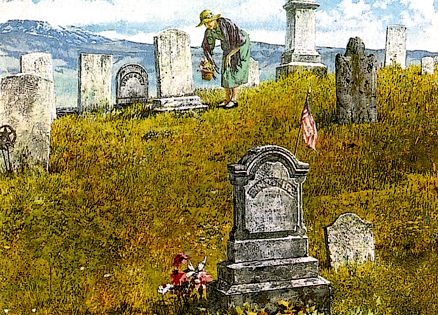Another Memorial Day, cold and dreary—the worst holiday weekend I could remember. And worst of all, my husband and I still lived in this isolated town of nearly 1,000 people high in the Sierra Nevada in northeastern California. A town where I never felt I belonged.
"You'll get used to it," my husband had said when he persuaded me to move here from Sacramento, where our flatlander families lived, three hours away. "There'll be no smog, no traffic jams—"
"And nothing to do," I finished. "We'll be cut off. Where will I work?"
"You can work in my law office," Craig said. "Reno and the shopping malls are only an hour away, the scenery's spectacular—you'll like it."
"Maybe," I said. "As long as it's only temporary."
But as months went by, then years, "temporary" was looking pretty permanent. And even though the townspeople had made us feel more than welcome and the children seemed content, I'd never thought of this place as home.
Will I ever feel as if I belong here, I wondered.
The rain had stopped and I felt a sudden urge to get out of the house, to escape. I decided to go for a walk.
Three blocks away I paused at the gate of the local cemetery. It was on a hill overlooking the town, and it somehow seemed to beckon to me. I hurried through the gate and climbed the hill. The wind stung my cheeks as I walked among the plots, looking at the graves, some with simple markers, some more elaborate. What had drawn me here?
And then I noticed Pauline, an energetic 70-year-old from our church. She was leaning over a grave, straightening flowers that had blown over, fitting the container back into the white rock. Pauline could out-walk many of us younger women and then go on to organize a church dinner. She was a challenger too, always asking the unanswerable questions at Sunday school.
But today as I watched, she brushed her cheek and stood back, staring down at the polished granite tombstone. "Hi, Pauline," I said, moving toward her.
She didn't say a word, but reached for me with both arms. It was more than a hello-on-Sunday hug; it was as though she needed someone right then and there to understand the moment. Her husband had died three years earlier. "There are so many memories here," she said.
"Tell me some of them."
For the next hour we walked up and down the rows of headstones as Pauline recalled many of the people whose names appeared. And then she pointed out a tiny headstone for a baby who had been stillborn to a woman we both knew.
Nearby was the grave of another woman from church, Emma. I had visited Emma a lot. Her blue-and-white gingerbread-fringed home had always smelled of just-baked bread. We never parted without my taking home something to eat and her challenging me to "git into the Bible."
Then Robert DeMartini drove up in his pickup with his two boys. He had flowers for his parents' graves. I had sung at his mother's funeral several years ago. It was the hardest solo I'd ever done—for the mother of a friend.
At the far side of the cemetery was a spectacular view of the valley—manicured green fields stretched beneath towering mountain peaks covered with snow. Even on that day, it was breathtaking.
Pauline pointed toward two tall markers on the edge of the hill. "They seem to be standing watch over the town," she said.
I stared at the two tall markers, thinking about the families who had put them there, and then my gaze drifted directly between them. To my surprise I found myself looking down at a two-story house. My house. I'd never realized it was visible from this vantage point.
How peculiar, I thought, to be juxtaposed with those who have lived and died in Loyalton.
As I stood there, God's spirit touched me with a quiet, new understanding: You will love and you will be loved right here where I have planted you.
In a flash I thought of them all: the people who had brought us meals and helped us clean up when our house was flooded; the neighbors who had started my car twice when it broke down; the willing babysitters who had appeared when my son became ill.
Why had it taken so long for me to see it? When I first came to this small town, I feared I'd be isolated, cut off. Instead, I had all these friends, all this love. And isn't that what belonging is all about?
I turned and took in the panorama of the cemetery, filled with the flowers brought in for that special day. Almost every grave was decorated. Someday mine will be too.
The sun broke through the threatening clouds, sending a lovely light all around us. Pauline looked at me and smiled. "Ready to head for home?" she asked.
"Oh, Pauline," I said, putting my arm through hers. "I am home."






